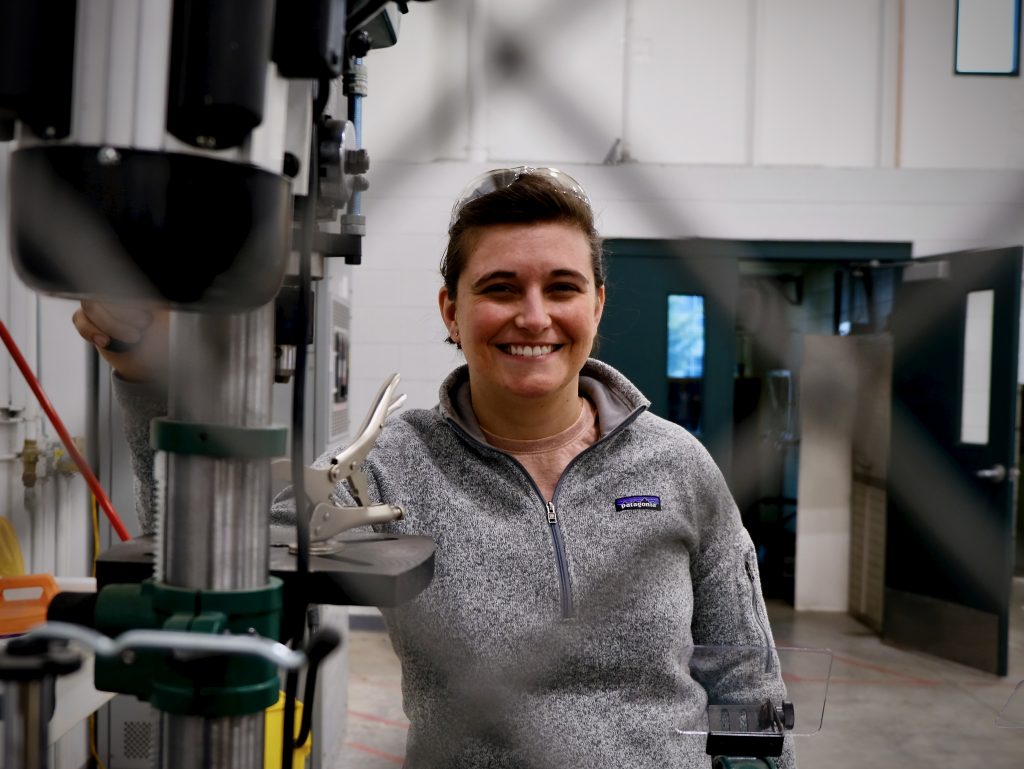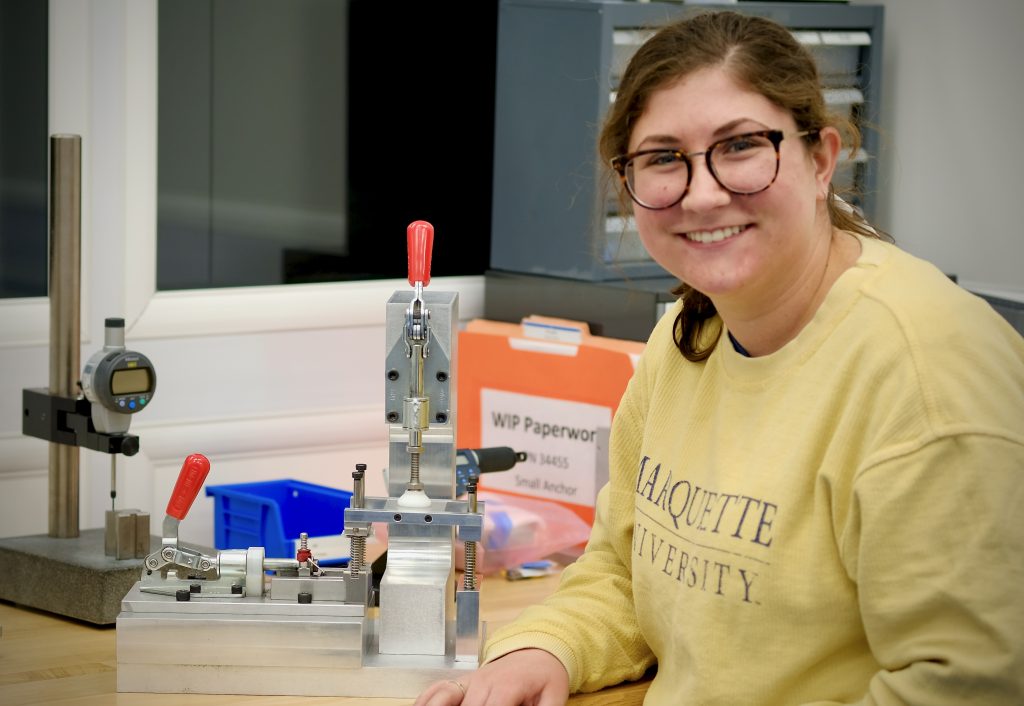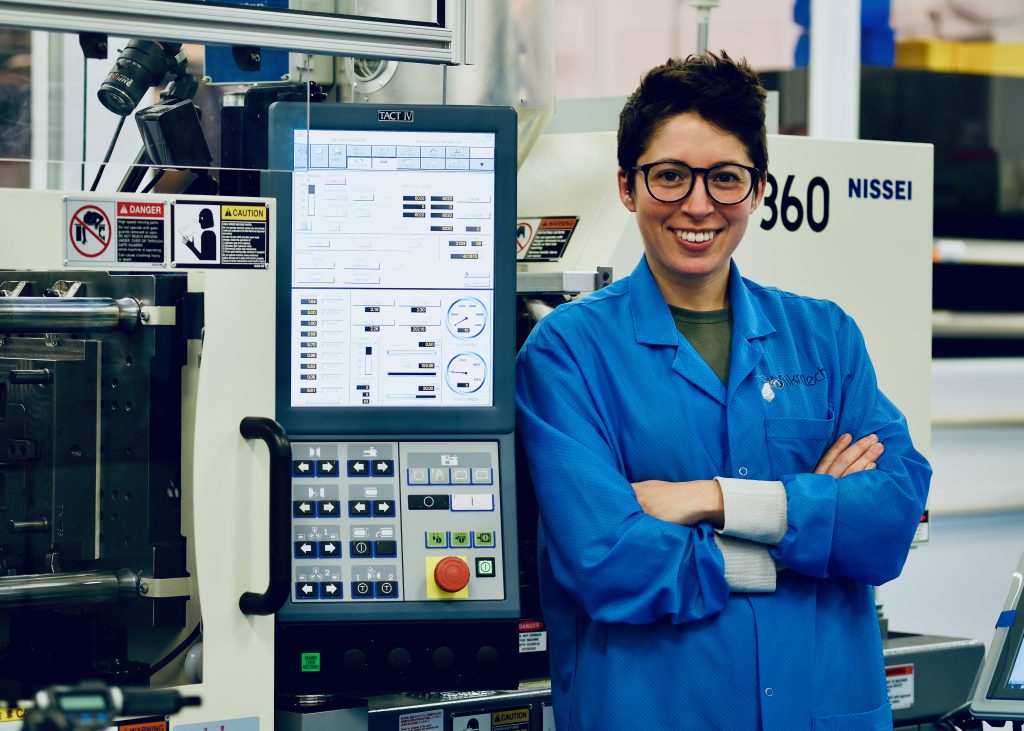For Women’s History Month, we shine a spotlight on women who are “breaking the mold”
When it comes to career paths for women, Manufacturing and Engineering are two fields that have long been described as “non-traditional.” On the surface, the numbers bear that description out: According to
Labor Department statistics, women hold only 29% of manufacturing jobs overall in the US, and are underrepresented across all engineering disciplines and in technical positions such as machining and tool and die specialties.But that’s all changing. More and more women are finding opportunities in traditionally male-dominated arenas, due in no small part to companies like Mikrotech. Actively recruiting, training and promoting women to leadership roles is a core part of our company’s mission.Case in point: We’re proud of the professionalism and expertise of our senior management staff, who include Mikrotech Engineering Program Manager
Kelli Dimmer and Director of Manufacturing
Alicia Santos. Kelli and Alicia are among a new generation of women building successful careers in the micro manufacturing industry. Each has followed her own path to the positions they now hold in the company, bringing their unique perspectives, experiences and on-the-job learning that has helped them excel.

Kelli joined Mikrotech in 2014, four years after graduating from Marquette University in Milwaukee with a bachelor’s degree in biomechanical engineering and a minor in biology.“When applying for the position at Mikrotech, I was truly excited to apply my degree to my career,” she told
Plastic News in a 2018 profile of women who are “breaking the mold.”Kelli had previously held engineering design positions with Wisconsin-based Harley-Davidson, in its ergonomics division, and at HyPro, a precision machining and manufacturing company. She was drawn to Mikrotech for our specialization in manufacturing micro medical components used for minimally invasive surgery.
Being able to combine my biomedical engineering degree with my passion for manufacturing was a great opportunity.
Growing up, Kelli enjoyed building things with her dad. She also enjoyed playing sports, a love she inherited from her mother, who was a star athlete in school. “Back in the ’70s, women had a lot of [obstacles] that they had to overcome. It shaped who they were and [my mother] applied [those lessons] to me when I was growing up.” Like, for instance, not paying any mind to those who said she couldn’t do something simply because of her gender. The best advice, she said, was from her dad: “Prove them wrong.”That Kelli chose to attend Marquette University was a no-brainer. Like micro manufacturing, biomedical engineering is a relatively new field; universities didn’t start offering it as a major until the late 1960s. One of the first women biomedical engineers, Barbara L. Christe, PhD, who began her career in biomedical engineering in 1974, earned both her undergraduate and master’s degrees from
Marquette University. (Dr. Christe enjoyed a long career in academia and is currently the dean of the School of Engineering Technology at Farmingdale State College in New York.)The field of biomedical engineering continues to attract more women than other engineering disciplines. In fact, women currently make up 46% of biomedical engineering graduates, according to
Career Explorer. It’s also a growing field, due to new technologies and increasing applications in the life sciences and manufacturing industries.Today, 75% of Marquette University’s biomedical engineering majors co-op or intern while they’re undergraduates — one of the highest percentages in the nation. This has been a boon to Mikrotech. We have an active internship program and currently have two Marquette University students participating in a work-study partnership with us.
Olivia Lewis, who will graduate in 2022, has been interning with Mikrotech during her sophomore and junior years.

“I chose to pursue a co-op position at Mikrotech after learning about what the company does with micromolding for the medical industry,” Olivia explains. “One of my goals as I start my career as a biomedical engineer is to make people’s lives better and I know that the parts that Mikrotech molds for the medical industry do just that.“This learning experience has been very beneficial to me as a student,” Olivia continues. “I will be able to graduate college with not only knowledge about the engineering field in general, but also specific knowledge pertaining to plastic injection molding. This knowledge and experience will better prepare me for my future as an engineer.”
“I love being part of this growing company and what we do, making really small things that solve very big issues.”
Alicia Santos, our Director of Manufacturing, joined Mikrotech nearly nine years ago. Alicia oversees Mikrotech’s manufacturing operations, as well as all purchasing, shipping & receiving, and customer service for the company. In contrast to our engineering staff, Alicia’s career path with our company started in 2012 when we hired her in an entry-level position as a molding operator. Alicia had been enrolled at the University of Arizona with the goal of becoming a nurse. But she put her studies on hold to work with us full time, and developed her skill sets on the job.

Because Mikrotech is a small company, Alicia was able to take on different roles, stretching beyond her job description to master processes and scheduling, quality control protocols, purchasing and account management.
“I began taking advantage of any opportunity Mark and Kevin were willing to throw my way,” says Alicia, who quickly moved up the ranks to Manufacturing Coordinator, followed by a promotion to Manufacturing Manager in 2018.
“Working with a small team has allowed me to intimately gain experience in many facets of the supply chain,” she notes. “I have assumed the responsibilities of account manager, the purchasing/buyer role, and shipping. This experience has helped me become a more well-rounded leader to my team.“I never imagined that taking the machine operator position back when I was 20 would evolve into the stable and rewarding career that it is today,” adds Alicia, who resumed her college studies and is now pursuing a degree in geography. She is applying her coursework in statistics to her job. “I have been able to transfer some of that knowledge over to my day to day operations, often closely monitoring production and scrap against our weekly, monthly, and quarterly goals/ standards.“I like working with a small company,” she adds. “You get to wear many hats and learn every aspect of the job, and you gain an appreciation for the different skills and jobs people have. I love being part of this growing company and what we do, making really small things that solve very big issues.”
 Kelli joined Mikrotech in 2014, four years after graduating from Marquette University in Milwaukee with a bachelor’s degree in biomechanical engineering and a minor in biology.“When applying for the position at Mikrotech, I was truly excited to apply my degree to my career,” she told Plastic News in a 2018 profile of women who are “breaking the mold.”Kelli had previously held engineering design positions with Wisconsin-based Harley-Davidson, in its ergonomics division, and at HyPro, a precision machining and manufacturing company. She was drawn to Mikrotech for our specialization in manufacturing micro medical components used for minimally invasive surgery.
Kelli joined Mikrotech in 2014, four years after graduating from Marquette University in Milwaukee with a bachelor’s degree in biomechanical engineering and a minor in biology.“When applying for the position at Mikrotech, I was truly excited to apply my degree to my career,” she told Plastic News in a 2018 profile of women who are “breaking the mold.”Kelli had previously held engineering design positions with Wisconsin-based Harley-Davidson, in its ergonomics division, and at HyPro, a precision machining and manufacturing company. She was drawn to Mikrotech for our specialization in manufacturing micro medical components used for minimally invasive surgery. “I chose to pursue a co-op position at Mikrotech after learning about what the company does with micromolding for the medical industry,” Olivia explains. “One of my goals as I start my career as a biomedical engineer is to make people’s lives better and I know that the parts that Mikrotech molds for the medical industry do just that.“This learning experience has been very beneficial to me as a student,” Olivia continues. “I will be able to graduate college with not only knowledge about the engineering field in general, but also specific knowledge pertaining to plastic injection molding. This knowledge and experience will better prepare me for my future as an engineer.”
“I chose to pursue a co-op position at Mikrotech after learning about what the company does with micromolding for the medical industry,” Olivia explains. “One of my goals as I start my career as a biomedical engineer is to make people’s lives better and I know that the parts that Mikrotech molds for the medical industry do just that.“This learning experience has been very beneficial to me as a student,” Olivia continues. “I will be able to graduate college with not only knowledge about the engineering field in general, but also specific knowledge pertaining to plastic injection molding. This knowledge and experience will better prepare me for my future as an engineer.” Because Mikrotech is a small company, Alicia was able to take on different roles, stretching beyond her job description to master processes and scheduling, quality control protocols, purchasing and account management.
Because Mikrotech is a small company, Alicia was able to take on different roles, stretching beyond her job description to master processes and scheduling, quality control protocols, purchasing and account management.